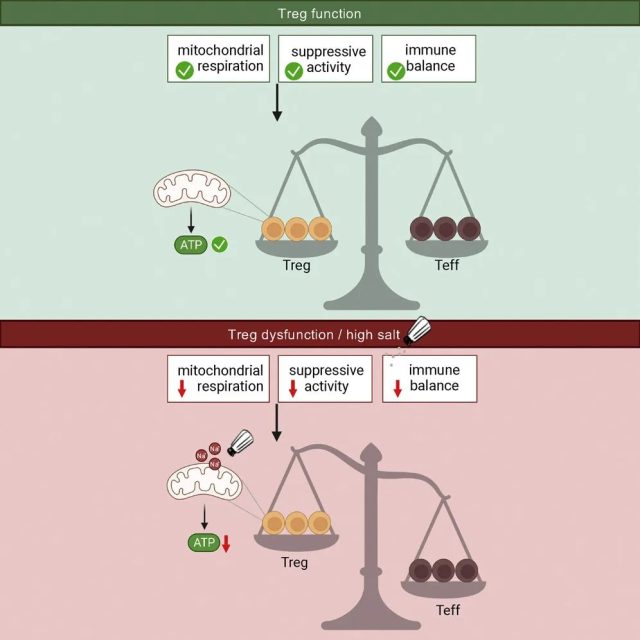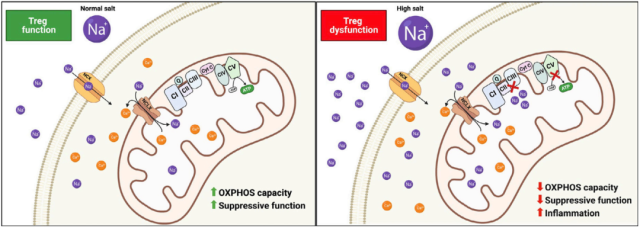Eating too much salt will damage the mitochondrial respiration of regulatory T cells and affect metabolic health
- Normal Liver Cells Found to Promote Cancer Metastasis to the Liver
- Nearly 80% Complete Remission: Breakthrough in ADC Anti-Tumor Treatment
- Vaccination Against Common Diseases May Prevent Dementia!
- New Alzheimer’s Disease (AD) Diagnosis and Staging Criteria
- Breakthrough in Alzheimer’s Disease: New Nasal Spray Halts Cognitive Decline by Targeting Toxic Protein
- Can the Tap Water at the Paris Olympics be Drunk Directly?
Eating too much salt will damage the mitochondrial respiration of regulatory T cells and affect metabolic health
- Should China be held legally responsible for the US’s $18 trillion COVID losses?
- CT Radiation Exposure Linked to Blood Cancer in Children and Adolescents
- FDA has mandated a top-level black box warning for all marketed CAR-T therapies
- Can people with high blood pressure eat peanuts?
- What is the difference between dopamine and dobutamine?
- How long can the patient live after heart stent surgery?
Eating too much salt will damage the mitochondrial respiration of regulatory T cells and affect metabolic health
Salt is the most indispensable condiment in the daily diet. In addition to making food more flavorful, it is also an essential substance to ensure the normal physiological functions of the human body.
But too much is too much, and many studies have proven that long-term excessive salt intake is not only harmful to our blood pressure and cardiovascular system, but may also have adverse effects on the immune system.
On February 7, 2023, the journal Cell Metabolism published a research paper entitled: Sodium perturbs mitochondrial respiration and induces dysfunctional Tregs .
A high-salt diet has been shown to alter immune function and promote autoimmunity.
This study is the first to show that a high-salt diet can severely affect the cellular metabolism and functional suppression of Tregs .
Specifically , sodium salt can lead to metabolic reprogramming, even after a short-term high A salt diet also interferes with the mitochondrial metabolic fitness and long-term function of Tregs.
Mechanistically, a high-salt diet increases intracellular Na+, disrupting mitochondrial respiration by interfering with the electron transport chain (ETC) .
Metabolic derangement induced by transient high-salt diet or complex III blockade rapidly induces pro-inflammatory signaling and downregulation of FOXP3, leading to long-term dysfunction in vitro and in vivo.
High-salt diet-induced metabolic impairment is reversed by inhibition of the mitochondrial Na+/Ca2+ exchanger (NCLX) .
This study is not only of great significance for autoimmunity, but also provides a new way to explore the development of autoimmunity and cardiovascular diseases.


A few years ago, the team’s research revealed that too much sodium in the diet can trigger mitochondrial malfunction in certain types of innate immune cells (monocytes and macrophages) , with consequent consequences for the metabolism and energy balance of these cells. Negative effects, inhibiting its proper functioning.
Based on the above findings, the research team wanted to further explore whether excessive sodium intake would have similar effects on adaptive immune cells such as Tregs cells .
Regulatory T cells (Tregs) , an important part of the adaptive immune system, are responsible for maintaining the balance between normal function and unnecessary excessive inflammation.
Tregs are sometimes called the “immune police” because they keep “bad guys” like self-reactive immune cells at bay and ensure that the immune response occurs in a controlled manner without harming itself.
Scientists believe that dysregulation of Tregs is linked to the development of autoimmune diseases such as multiple sclerosis (MS) .
Recent studies have identified problems with mitochondrial function associated with Tregs in patients with autoimmune diseases, but the cause remains unclear.
Taking into account previous findings that sodium salt affects mitochondrial function in innate immune cells, as well as new findings on mitochondria in Tregs from patients with autoimmune diseases, the research team wanted to further explore whether sodium salt would cause similar problems in Tregs from healthy people.
Previous studies have also shown that excess sodium can affect Tregs function by inducing an autoimmune-like phenotype.
That is, too much sodium can make Tregs look like those involved in autoimmune diseases. However, exactly how sodium salts impair Treg function is still unclear.
In this study, the research team found that sodium salts disrupt Tregs function by altering cellular metabolism by interfering with mitochondrial energy production.
This mitochondrial problem appears to be the first step in how sodium salts alter the function of Tregs, leading to changes in gene expression that show similarities to dysfunctional Tregs in autoimmune conditions.
Specifically, a high-salt diet increases intracellular Na+, which disrupts mitochondrial respiration by interfering with the electron transport chain (ETC) .
Metabolic derangement induced by transient high-salt diet or complex III blockade rapidly induces pro-inflammatory signaling and downregulation of FOXP3, leading to long-term dysfunction in vitro and in vivo.
High-salt diet-induced metabolic impairment is reversed by inhibition of the mitochondrial Na+/Ca2+ exchanger (NCLX) .

Even a transient disruption of mitochondrial function can have long-term effects on the adaptive and immunomodulatory capabilities of Tregs.
This latest finding suggests that sodium salt may be a factor in the dysfunction of Tregs, which may play a role in different diseases .
Since Tregs also play a role in diseases such as cancer and cardiovascular disease, further exploration of this sodium salt-induced effect may provide new strategies for modifying the function of Tregs in different types of diseases.
Paper link :
https://doi.org/10.1016/j.cmet.2023.01.009
Eating too much salt will damage the mitochondrial respiration of regulatory T cells and affect metabolic health
(source:internet, reference only)
Disclaimer of medicaltrend.org
Important Note: The information provided is for informational purposes only and should not be considered as medical advice.



